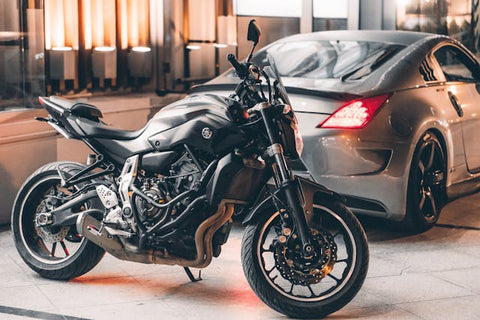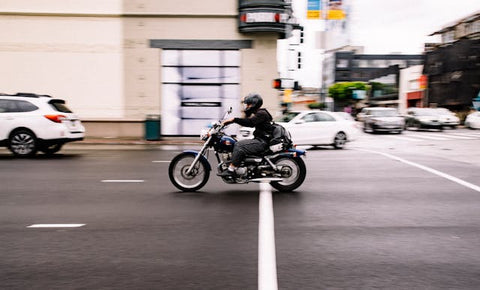Life demands tough choices. Selecting between buying a car and a motorcycle is a pivotal one way beyond transport.
It's about aligning your vehicle with lifestyle, priorities, and values. This decision's significance is immense, impacting convenience, finances, and the environment.
So, this article will explore the pros and cons, empowering readers with knowledge for informed choices. From costs to safety, environmental impact, and beyond, it'll analyze every facet comprehensively. You'll be equipped to navigate this pivotal decision confidently and clearly.
Cost Comparison
Comparing the costs of cars and motorcycles, there are clear differences. Motorcycles typically offer lower purchase prices and fuel costs than cars. However, with modern technology, new GMC vehicles come with improved engines that will consume less fuel compared to before. Cars have above-average insurance premiums, maintenance costs, and depreciation rates. It's important to consider long-term expenses beyond initial cost, like maintenance and resale value, to understand the financial impacts fully for each choice.

Practicality and Convenience
Cars provide room for luggage and passengers, shielding them from bad weather. This suits them for family trips and long journeys. Motorcycles, though, move nimbly through city traffic. Commuting and parking differ greatly between the two vehicles. Cars usually offer simpler commutes and parking. Motorcycles often beat traffic jams and find spots in packed urban areas. Ultimately, which is more practical depends on your needs and how you'll use it.
Safety Considerations
Cars have many safety features such as airbags, anti-lock brakes, and collision avoidance technology. This helps protect people inside if there's an accident. However, motorcycles don't have these protections. Riders are exposed to the elements and vulnerable in crashes. To stay safe, motorcycle riders need proper gear like helmets, jackets, gloves, and sturdy boots. They must also ride defensively and stay vigilant to reduce accident risks. Even so, sadly, in car motorcycle collisions, motorists are 28 times more likely to lose their lives than drivers. Motorcycles offer freedom and agility, but riders accept increased safety concerns.
Lifestyle and Image
Cars and motorcycles symbolize lifestyles and images beyond transportation. The ownership of a sleek sports car often conveys a sense of luxury and sophistication. It reflects a refined taste and status. On the other hand, riding a motorcycle evokes a feeling of freedom and adventure. It appeals to individuals seeking excitement and unconventional experiences. Personal preferences and societal perceptions heavily influence this decision. People are drawn to vehicles that align with their desired image and lifestyle. Consequently, when choosing between cars and motorcycles, individuals consider not only practicality but also the social and personal implications of each option.
Maintenance and Repairs

Cars and motorcycles have different maintenance needs. Cars benefit from widespread service centers, and their parts are easy to find for most models. This helps keep maintenance costs lower. Motorcycles, on the other hand, often need specialized work.
Their complex parts require expert knowledge. With that, its repair bills can be higher. Moreover, reliability varies between models. Some last longer than others, and this affects overall maintenance costs.
Buyers should consider running costs and not just the initial price. They need to factor in keeping the vehicle's top condition.
Versatility and Usage
Cars suit long trips and family outings. Their spacious insides hold passengers and cargo, offering comfort and movement freedom for long trips. However, when it comes to traversing short distances and narrow roads in rugged terrain, motorcycles shine in these conditions. Off-road capabilities offer adventurous exploration as well. When choosing a transportation method, whether a car or motorcycle, it's key to grasp your intended use and select the vehicle that fits best with your lifestyle and needs be it a car's practicality for family trips or a motorcycle's agility for city commuting.
Resale Value and Depreciation
Resale value and depreciation rates are crucial factors to evaluate a vehicle's long-term financial impact. Cars typically experience faster depreciation, but they often maintain higher resale values due to broader market demand and brand recognition. Motorcycles, on the other hand, typically lose value at a slower pace, yet might face hurdles in fetching attractive prices in the used market. A brand's reputation and a model's popularity greatly sway these patterns, emphasizing the necessity to ponder over these elements when assessing the monetary ramifications of vehicle ownership.
Picking a car versus a motorcycle involves critical thinking, as there's no one-size-fits-all answer. Each has its pros and cons. Thus, buyers must consider personal needs and situations. Some prioritize safety, others price and environmental impact. However, it will still be prudent to balance those factors so that you come up with a wise decision within one's lifestyle and values. With a holistic consideration of these factors, one can get a car that fits their needs and preferences to guarantee a satisfying and fulfilling ownership experience.
ABOUT THE AUTHOR
Olivia Poglianich
Content Strategist
Olivia Poglianich is a nomadic brand strategist and copywriter in the motorcycling and adventure space who has worked with brands such as Visa, Disney and Grey Goose. Her writing has taken her all over the world, from a Serbian music festival to a Malaysian art and culture event. Olivia is a graduate of Cornell University and is often writing or reading about travel, hospitality, the start-up ecosystem or career coaching. Her latest interests are at the intersection of web3 and communal living, both on and offline.






